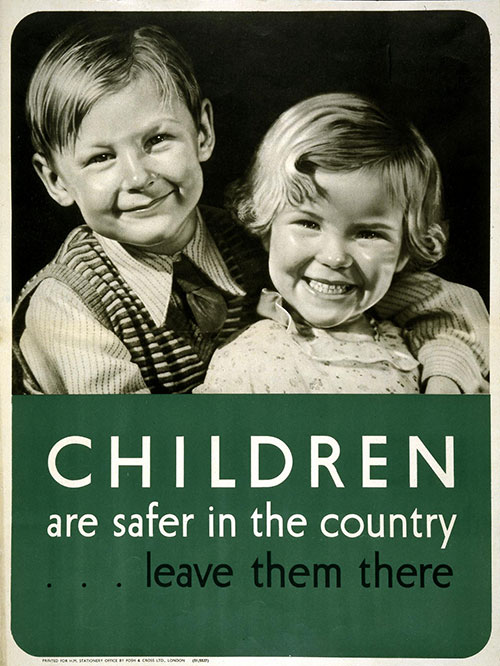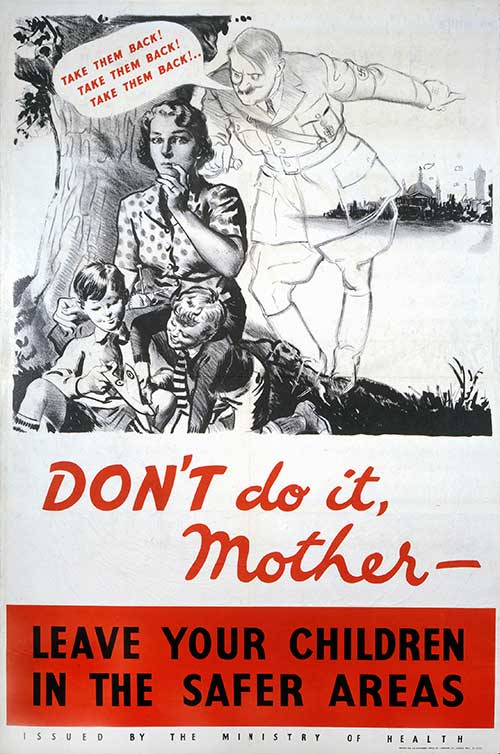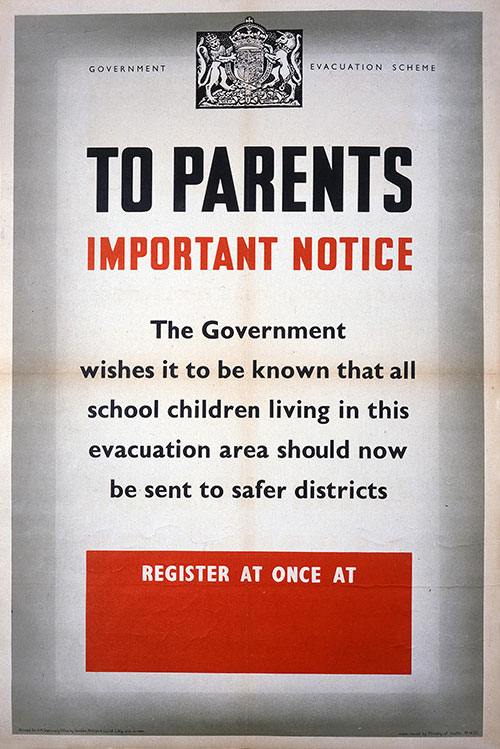One of my favourite books as a child was ‘The Lion, the Witch and the Wardrobe’ by C S Lewis, a story about four siblings who are evacuated from London during the Second World War to escape the Blitz. The children end up in an old country house, and are left to explore a large wardrobe in a spare room. Of course, the Lion, the Witch and the land of Narnia were fantasy, but in reality the story mirrored the new surroundings that children found themselves in as evacuees…

Evacuation Children Are Safer in The Country, 1939-1945, Central Office of Information, catalogue reference INF 13/171 (1)
The mass exodus of civilians in Britain during the Second World War was designed to protect people – especially children – from aerial bombing, by moving them to areas thought to be less at risk. In the summer of 1939, more than 3 million children were evacuated from London and other cities in ‘Operation Pied Piper’, while most parents stayed behind to work and help out with the war effort.
For many children, this was a time of great upheaval and the transition from one region to another was extremely stressful, as you can imagine. Children were lined up outside schools and stations, clutching small backpacks with gas masks and one toy each, identified only by a name tag. After the tears and goodbyes, it was off to the scary unknown: to families they’d never met, to places they’d never even heard of and, in some cases, overseas.
Although England and France declared war on Germany in September 1939, the start of the war seemed to be a long time coming. Bombing was non-existent until May 1940 and the lull in proceedings, known as the ‘Phoney War’, led to many parents of evacuees bringing their children home. ‘Evacuees of the Second World War’ explains in detail the uncertainty of the Phoney War and the government’s plans for evacuation up to the homecomings of 1945 and the aftermath.

Evacuation Don’t Do It, Mother, 1939-1945, Central Office of Information, catalogue reference INF 13/171 (3)
For some urban children, separation was their first taste of living in the countryside or abroad: not all of them found the change easy to adapt to. Some children were treated badly; others, however, found new friends and enjoyed new experiences. At the same time, parents were heartbroken to see their families divided, and the process wasn’t always the answer to securing children’s safety. The book ‘Evacuees: Children’s Lives on the WW2 Home Front’ is a fascinating insight into how these children dealt with family separation during the war. It reads from a collection of stories from former evacuees: these include personal memories and accounts of what it was like to settle into a new home with strangers, often staying for years. There are additional descriptions of the many who experienced life in the countryside, some escaping inner-city poverty and others enduring ill-treatment and homesickness.
Along the same lines, ‘Voices of the Second World War: a Child’s Perspective’ is a highly-recommended book, which describes different experiences of young evacuees across the world, and not just from England. It is a collection of chronicled true stories that draw on the memories and experiences of real people – who were children during occupation, bombing, deprivation, starvation and fear – from countries such as Russia to the Channel Islands and from Norway to Malta.

Evacuation to Parents Important Notice1939-1945, Central Office of Information, catalogue reference INF 13/171 (4)
When the War ended in September 1945, the evacuees could finally return home, although coming back to city life was just as emotional as when they left. Some children found their houses had been bombed or their families had departed, or no longer wanted them; many were now four or five years older and their appearances and accents, outlooks and preferences had changed. ‘The Pitkin Guide to Evacuees’ covers the legacy of behavioural issues of returning children and the effects on the school system. It also explains the practical challenges of re-housing thousands of displaced children in small villages and towns in Britain.
The evacuation period officially came to an end in March 1946. On balance, although ‘Operation Pied Piper’ had caused unexpected long-term trauma, without the mass evacuation the death toll in the Second World War would, undoubtedly, have been much higher. For most, it was a happy reunion and brought an end to a prolonged period of fear, confusion and separation.
PLEASE NOTE: Due to the age of this blog, no new comments will be published on it. To ask questions relating to family history or historical research, please use our live chat or online form. We hope you might also find our research guides helpful.

The leaflets/posters were actually produced by the Ministry of Information which after the war became the Central Office of Information.
My sister (aged 8 1/2) and I (aged 6 1/2) were evacuated at the start of the war to Burley, a small village in Rutland. At first we were billeted with a family (I remember the names) who were very kind but after a couple of months we were moved to a new address where a man, his wife and a new born baby lived. ( I remember their names ) There was no running water and the toilet was a bucket under a wooden seat in an outhouse. The job of getting water for the house from a pump in the yard was given to me. Also I had to put the blackout boards up at the windows every evening. Food was minimal. We became feral, stealing food from wherever we could find it. School was almost forgotten. The teacher had to cut our finger and toe nails and our hair. My mother came to see us in 1940 and, having seen the conditions in which we were living, immediately brought us back to London where we remained for the rest of the war, bombing and damaged house included. My memories (I am now 86) of evacuation are not happy ones. However, we survived unlike many less fortunate.
My sister and I were in Reedham orphanage in 1944. Susan Elizabeth JOHN and me Wendy JOHN.
Susan and myself were evacuated from Reedham Orphanage in 1944 to Nottingham.
Does anyone remember us? Our home was in Barry South Glamorgan before going to the orphanage.
Wendy
My father John Parker was evacuated to Oxfordshire at the start of the war. Over the years I have heard about his sister (8) and himself then aged 10, clutching a little bag and their gas masks, standing on the station not knowing what was happening. Hundreds of children – after tearful goodbyes with their parents – were hurded into the trains to take them away for “safety”. They stopped at various places along the way, where people could come and choose who they wanted. Fortunately my Dad was taken by a childless couple called Mrs & Mrs Cross who lived and managed “Church Farm” in one of the smaller towns near Middle Barton. Sadly, they did not want any girls and so my Dad and his sister were separated. Being in the care of a farm manager – Mr Cross – my father was not encouraged to play games with the labour’s children, so he was mostly on his own until they enrolled him in the local school. There he came across his old childhood friend from London George Fage, although they were in different years at the school.
George wrote this in his autobiography back in 2007
“My pal John Parker had what we thought was a very cushy billet.He was put on a farm with a childless couple who looked after him very well. Maybe it was a bit too well, because they never let him out to play….every Friday night they gave him a big spoonful of Brimstone and Treacle to keep him regular….When I pulled John’s leg about not seeing him to pay with at the weekends, he said he was too busy going to the loo all day.”
My father was kept pretty busy on the farm and was given various jobs to do, having never seen many animals in London he was pretty terrified of cows and pigs; hated working outdoors and would often scarp off with another evacuee and get into all sorts of trouble.
The Cross’s were not affectionate but I think they did care for my father as he was with them for nearly 2 years! His Mother visited once in that time and his sister who had not been well looked after had already gone home. At one point I think Mrs Cross wanted to adopt him, maybe this is why his Mother came up to Oxford to state her claim – who knows? My father (93) still regales us with his childhood stories and new ones pop out every so often. His short term memory is poor but stuff he did 80 years ago is quite clear, especially his home life before and after the war. His father was a Chemist (but spent just about all his money in pubs whilst his mother had 5 children to raise). I met my Nana when I was about 4 or so, she had seen tough times but had lived longer that her husband.
My father tried to help her out when he could but left to join the army when he was 17 as the household was never a pleasant place to be. I would like to write his story down because it is so interesting.
These stories are so sad. My own father was evacuated to Wales. He was treated badly and lived in a hovel. My mother had a better time of it. The owner of the large house called her Penelope, even though that wasn’t her name. Eventually, my grandmother could not stand the children being away and so brought them back home.
My elder brother and I were evacuated to Leckford and. we’re sent to live in John Lewis,s house.
We lived in the billiard room.
Me aged 6 and my two brothers ages 7 and 9 were evacuated to a Railway Orohanage in Derbyshire (now a women’s prison ) after our Fathers death in 1942 on Christmas Day, we went in March 1943 and our Mum took us back to London in March 1944 in time for the blitz !
Wow listening to these short stories is so interesting I’m 35 year old women. My grandmother past in December 2023 at the great age of 89 I learnt she was taken to devon with her 2 sisters an her mother took her back to London after realising they weren’t treated correctly 💔 I never knew this bout my nan I always thought she stayed in London the whole time. I don’t no what she saw nor what she n siblings whent through. Know wonder she was a strong women clearly something bad whent on for her to never mention it. Listening to people tell there stories is so interesting I would like to show my appreciation as a young women to those children of ww2 I can imagine the world has changed so much. Thank you everyone for your version of what went on.
This was very helpful to learn more about World War II
I love these’d nationalarchives I am a 20 year old woman and I have never been so interested in my life😄 I showed my daughter these and she loves this she showed her teacher this website because she is learning about archives and now my daughter knows so much thank u do much for the website ☺️
I was evacuate Dartmouth aged 5 along with my older sister. I think this was after a V1 fell nearby, destroying our house.
My sister and I were housed in the loft, sleeping on the floor. I recall we did not get much to eat and was always hungry. We were both allowed out to roam by ourselves. I recall being worried by the quayside that was not far away where a large barge was moored. There was a big drop between the barge and the edge of the quay.
At some point I got very ill with pneumonia and my mother has to come and collect me. The train journey back was difficult with all the stations in darkness because of the blackout.
PLEASE NOTE: Due to the age of this blog, no new comments will be published on it. To ask questions relating to family history or historical research, please use our live chat or online form. We hope you might also find our research guides helpful.